|
|
|
Sort Order |
|
|
|
Items / Page
|
|
|
|
|
|
|
| Srl | Item |
| 1 |
ID:
184995
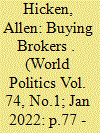

|
|
|
|
|
| Summary/Abstract |
Studies of electoral clientelism—the contingent exchange of material benefits for electoral support—frequently presume the presence of strong parties. Parties facilitate monitoring and enforcement of vote buying and allow brokers to identify core voters for turnout buying. Where money fuels campaigns but elections center around candidates, not parties, how do candidates pitch electoral handouts? The authors analyze candidates’ distribution of cash during an Indonesian election. Drawing upon varied data, including surveys of voters and brokers, candidates’ cash-distribution lists, and focus-group discussions, they find heavy spending but little evidence of vote buying or turnout buying. Instead, candidates buy brokers. With little loyalty or party brand to draw on, candidates seek to establish credibility with well-networked brokers, who then protect their turf with token payments for their own presumed bloc of voters. The authors find little evidence of monitoring of either voter or broker behavior, which is consistent with their argument that these payments are noncontingent.
|
|
|
|
|
|
|
|
|
|
|
|
|
|
|
|
| 2 |
ID:
159014


|
|
|
|
|
| Summary/Abstract |
This article examines clientelism in Iraq as a case study of one form of corruption. Iraq is an unusual case of corruption, because a key feature of Iraq's corrupt environment is an institutionalised factional political system based on sectarian quotas. The article explores the many links between clientelism and political factionalism, discussing whether clientelism arose because of factionalism, or whether factionalism merely determines the ways that clientelism currently operates in Iraq. Using fieldwork data, the findings show there are two distinct levels of clientelism in Iraq, both of which are linked to political factions: the individual level and the organisational level. First, clientelism at the individual level entails the elites of many political factions regarding ‘money politics’ as a means of influence in Iraq/Kurdistan by buying people's affiliations and thereby governing people. Second, clientelism at the organisational level entails that the spoils of political office are shared out among the elites of the political factions in a proportionate fashion. The article concludes that clientelism is a form of political rather than economic corruption; and that while there may be some immediate value in clientelism, its long-term harm outweighs its short-term value.
|
|
|
|
|
|
|
|
|
|
|
|
|
|
|
|
| 3 |
ID:
156429
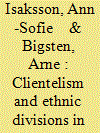

|
|
|
|
|
| Summary/Abstract |
This article investigates the commonly assumed link between ethnic divisions and clientelism in African politics by examining the role of contextual ethnic divisions and specific ethnic affiliations in shaping attitudes towards clientelism. The empirical findings, drawing on quantitative data for 38,293 survey respondents across 25 African countries suggest important country heterogeneity, but also highlight some regularities. In particular, the ethnic composition of the population in the area of residence, rather than the individual's own ethnic affiliation, is important in shaping support for clientelism. Individuals living in a region where the majority of the population is the president's co-ethnics tend to be more supportive of clientelism, regardless of their own ethnic affiliation. The wide coverage of the results makes them especially interesting; while a number of studies suggest ethnically based targeted transfers in specific sectors or settings, this study explores the links between different forms of ethnic divisions and support for clientelism in a large multi-country African sample.
|
|
|
|
|
|
|
|
|
|
|
|
|
|
|
|
| 4 |
ID:
133647
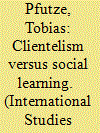

|
|
|
|
|
| Publication |
2014.
|
| Summary/Abstract |
Most research on the effects of international migration on democratic institutions in sending countries focuses on how emigration changes the civic and democratic values of those left behind. Little attention has been given to how the additional income provided by migrant remittances alters the incentive structure of the political actors involved and how this will affect political outcomes. This paper develops a voting model that accounts for the effect of higher income through remittances and shows that its expected effects on voter turnout patterns differ in important ways from those of improved civic values. Taking these predictions to the data, it is shown that, for the case of Mexican municipal elections over the year 2000-2002 period, the empirical evidence strongly supports the notion that international remittances had a positive effect on electoral competitiveness in Mexico by reducing the clientelistic power of the formerly dominant state party (Institutional Revolutionary Party). This result is robust to the use of instrumental variables.
|
|
|
|
|
|
|
|
|
|
|
|
|
|
|
|
| 5 |
ID:
197061


|
|
|
|
|
| Summary/Abstract |
It is often assumed that power is exerted through patron–client exchanges in Bangladesh. These patron–client relationships are dispersed and multifaceted, kept together by moral closeness and tenderness. The incumbent government of Bangladesh rigged the last 2014 and 2018 national elections through the clientelist process. In Bangladesh, clientelism has become an art form that encompasses a wide variety of illegal electoral strategies and crimes. Brokers have a crucial part to play in this process because they are responsible for controlling patron–client interactions. Even while clientelism is thought of as an investment in public goods for the underprivileged, it has been demonstrating severe democratic degradation causes in countries that are still in the process of creating their democracies. This study explores how clientelism, broker dominance, and particularly the patron–client situation led Bangladesh to transition from a two-party or multiparty democratic state to a one-party dominant state that is flavored with authoritarian democracy. It also demonstrates how this has led to the emergence of a society in which free and fair election is an illusion.
|
|
|
|
|
|
|
|
|
|
|
|
|
|
|
|
| 6 |
ID:
165526
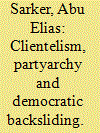

|
|
|
|
|
| Summary/Abstract |
In a developing country like Bangladesh, the devolved local government system is widely recognized as one of the key institutional forms for the citizen-centric public service delivery system and ensuring democratic governance at the grassroots level. However, the democratic nature of local governments and their effective role in rendering services are contingent upon the political and institutional environments of the country. Competitive electoral process is key to local democratic governance. The purpose of this article is to analyze the implications of contemporary political order and institutional environments for the proper functioning of the Union Parishad (council), the lowest tier of the local government system in Bangladesh. More specifically, this study will reflect on how political clientelism, partyarchy and institutional environments have stymied competitive electoral politics at the local level which may result in democratic backsliding.
|
|
|
|
|
|
|
|
|
|
|
|
|
|
|
|
| 7 |
ID:
139442
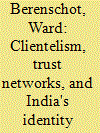

|
|
|
|
|
| Summary/Abstract |
With an election campaign for a seat in Gujarat's state parliament as its backdrop, this article relates India's persistent forms of identity politics to the evolution of trust networks. Political scientists and anthropologists have adopted highly divergent approaches to account for the ways in which India's politicians use social identities to mobilize support. A point of convergence, this article argues, lies in the social networks through which people solve everyday problems and organize access to state resources. Discussing the ever-changing salience of social divisions in Gujarat's politics – from class to caste to religion and region – this article argues that two characteristics of such trust networks – the extent to which these networks are organized along social divides and the extent to which they lend themselves to facilitating clientelistic exchanges with politicians – can foster or impede the political salience of these social divisions. The particular historical development of trust networks and their entanglement in patronage networks impacts the likelihood of the emergence of divisive political discourse.
|
|
|
|
|
|
|
|
|
|
|
|
|
|
|
|
| 8 |
ID:
146462


|
|
|
|
|
| Contents |
India’s urban slums exhibit dramatic variation in their levels of infrastructural development and access to public services. Why are some vulnerable communities able to demand and secure development from the state while others fail to? Based on ethnographic fieldwork and original household survey data, the author finds that party networks significantly influence the ability of poor urban communities to organize and demand development. In slums with dense party networks, competition among party workers generates a degree of accountability in local patron-client hierarchies that encourages development. Dense party networks also strengthen organizational capacity and provide settlements with vertical connectivity to politicians and officials. The presence of multiparty networks, however, may attenuate the positive influence of party network density. Interviews with political elites and the survey data suggest that politicians are less likely to provide services to slums with multiparty networks. From within settlements, partisan competition also creates perverse incentives for rival networks to undermine each other’s development efforts. This article contributes to scholarship on clientelism, which has overlooked variation in the density and partisan balance of patron-client networks across poor urban communities and the resulting divergences in democratic responsiveness and development that face those communities. It also contributes to research on distributive politics and the political economy of development.
|
|
|
|
|
|
|
|
|
|
|
|
|
|
|
|
| 9 |
ID:
121132


|
|
|
|
|
| Publication |
2012.
|
| Summary/Abstract |
Backed by studies finding only limited propensity for free-riding when communities have an interest in self-provision, the last few decades have seen a surge of interest in community-based development. A major caveat to the "second wave" of collective action studies, however, is that collective action often breaks down under hierarchical social relationships. This is unfortunate news for developing countries' rural societies, which are often entrenched in patron-client networks. Using a natural experiment found in the construction of a motorway, the article finds that clientelist relationships do not, in and by themselves, block peasant collective action. Rather, it is the interaction between clientelism and isolation that empowers patrons to block community-based projects. Peasants in connected villages face no such constraints, but instead rely on their patrons' assistance in collective projects, making the hierarchical network an additional resource.
|
|
|
|
|
|
|
|
|
|
|
|
|
|
|
|
| 10 |
ID:
111301


|
|
|
| 11 |
ID:
196335


|
|
|
|
|
| Summary/Abstract |
Croatia celebrated a decade of membership in the European Union by joining the euro currency and the Schengen Area of free movement on January 1, 2023. At the same time, however, the country is struggling with the economic, social, and political consequences of its semi-peripheral status. A series of reform challenges remain unsolved, including the continued dominance of clientelistic networks. Amid a set of overlapping crises, from the global financial meltdown to the COVID-19 pandemic, the country has seen a revival of conservative and patriarchal ideologies.
|
|
|
|
|
|
|
|
|
|
|
|
|
|
|
|
| 12 |
ID:
167977
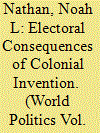

|
|
|
|
|
| Summary/Abstract |
This article studies the effects of traditional chiefs—a common type of broker—on voters’ ability to extract state resources from politicians. Using original data from Northern Ghana, the author shows that chieftaincy positions invented by colonial authorities are especially prone to capture, leaving voters worse off compared both to more accountable chiefs whose authority dates to the precolonial period and to voters who lack formal chiefs who can serve as brokers. The latter comparison exploits exogenous assignment of ethnic groups to the colonial invention of chieftaincy in the late nineteenth century. The findings suggest that whether voters benefit from brokers amidst clientelistic electoral competition depends on the accountability relationship between brokers and their clients.
|
|
|
|
|
|
|
|
|
|
|
|
|
|
|
|
| 13 |
ID:
160421
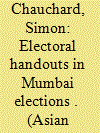

|
|
|
|
|
| Summary/Abstract |
Why do candidates give voters handouts during political campaigns? Drawing on qualitative data from Mumbai, this article argues that competitive elections prompt candidates to distribute handouts for strategic reasons. While they know handouts to be inefficient, candidates face a prisoner’s dilemma. Fearing that their opponents will distribute handouts, they distribute them themselves to counter, or neutralize, their opponents’ strategies.
|
|
|
|
|
|
|
|
|
|
|
|
|
|
|
|
| 14 |
ID:
186938
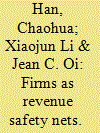

|
|
|
|
|
| Summary/Abstract |
The political connection between the state and firms in the context of China's corporate restructuring has been little explored. Using the clientelist framework and unpacking the incentives of both firms and the state, we analyse political connections as repeated patron–client exchanges where the politically connected firms can help the state fulfil its revenue imperative, serving as a failsafe for local authorities to ensure that upper-level tax quotas are met. Leveraging original surveys of the same Chinese firms over an 11-year period and the variations in their post-restructuring board composition, we find that restructured state-owned enterprises (SOEs) with political connections pay more tax than their assessed amount, independent of profits, in exchange for more preferential access to key inputs and policy opportunities controlled by the state. Examining taxes rather than profits also offers a new interpretation for why China continues to favour its remaining SOEs even when they are less profitable.
|
|
|
|
|
|
|
|
|
|
|
|
|
|
|
|
| 15 |
ID:
145755
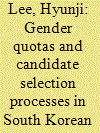

|
|
|
|
|
| Summary/Abstract |
South Korea is one of the few East Asian countries in which candidate gender quotas are legislated for all levels of government. However, the implementation of quotas has been only partially successful as political parties do not comply with quota laws in the majoritarian tier of the country’s mixed-member electoral system. To explain this non-compliance, this article examines how Korea’s party organizations and candidate selection practices have subverted quota implementation. More specifically, we employ Rahat and Hazan’s framework that disaggregates candidate selection processes into four areas—the selectorate, candidacy, centralization, and voting vs. appointment—and examine how two major Korean parties have chosen their candidates in the last three elections. By doing so, we demonstrate that in Korea’s under-institutionalized parties, where party organizations have been overshadowed by individual personalities, implementation of quotas can easily be subordinated to the clientelistic incentives of party leaders. While the parties’ centralized and exclusionary candidate selection procedures give party leaders a great deal of latitude to implement quotas, a better gender balance in the set of candidates is rarely a top priority for leaders in parties where personalism prevails. We argue that this explains why the quotas in Korea have been ineffective.
|
|
|
|
|
|
|
|
|
|
|
|
|
|
|
|
| 16 |
ID:
149173


|
|
|
|
|
| Summary/Abstract |
In the Cambodian national elections in 2013, the opposition Cambodia National Rescue Party (CNRP) experienced a strong surge in support, finishing a close second to the long-incumbent Cambodian People’s Party (CPP). Whilst the CNRP campaigned on an anti-money politics, rights-based agenda, the CPP has relied on gift-giving practices to maintain links with voters. This article explores changing popular conceptions of issue_images_89_4_nilsson_cambodia-election-perceptions-ea-image02-jpgprovision to assess to what extent a democratic, rights-based conscience in Cambodia has emerged under the current neo-patrimonial regime. Building on qualitative interviews with 192 voters in post-election Cambodia, it finds that gift-giving practices play a different role than current academic theorizations of popular politics, and Cambodian popular politics in particular, would lead us to expect. Ordinary Cambodians are found to make a distinction between contingent and non-contingent exchanges in electoral mobilization, rejecting the former and embracing the latter. CPP gift giving in its current guise is consequently devoid of popular legitimacy across the political camps. At the same time, the idea of meritorious gift giving lives on as an ideal, especially among CNRP supporters.
|
|
|
|
|
|
|
|
|
|
|
|
|
|
|
|
| 17 |
ID:
191818


|
|
|
|
|
| Summary/Abstract |
In this article, we explore the reasons why some ethnic groups tend to vote along ethnic lines while others do not. We argue that existing explanations for ethnic voting can be grouped into three main approaches: policy-based, grievance-based, and clientelism. However, we contend that inconsistencies in previous empirical research come from a failure to account for the political context in which ethnic voting occurs. Specifically, we argue that ethnic voting in democracies operates on a different logic than in non-democratic regimes. Our argument posits that policy- and grievance-based factors are the primary determinants of ethnic voting in democracies, whereas clientelist networks play a crucial role in understanding ethnic voting in autocratic regimes. To test our hypotheses, we use a sample of 428 ethnic groups from 33 African countries between 2005 and 2018, as well as a novel survey-based measurement of voting preferences among ethnic group members. Our findings support our hypotheses: in democratic regimes, grievance-based and policy-based explanations have strong explanatory power, whereas clientelism is the primary driver of ethnic bloc voting in autocracies. We conclude that both regime type and the different underlying mechanisms of clientelism require greater consideration in the research on ethnic voting.
|
|
|
|
|
|
|
|
|
|
|
|
|
|
|
|
| 18 |
ID:
114785
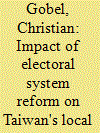

|
|
|
|
|
| Publication |
2012.
|
| Summary/Abstract |
This article discusses specific impacts of the abolishment of the single non-transferable vote (SNTV) in Taiwan. The SNTV had long been seen as a major factor in the sustenance of county- and township-level clientelist networks. It was associated with extremism, candidate-centered politics, vote-buying, clientelism and organized crime involvement in politics. This article examines the impact of the electoral reform on the mobilization capacity of a local faction in a rural county notorious for its factionalism. The analysis indicates that the clientelist structures are too resilient to be affected by even a radical electoral reform.
|
|
|
|
|
|
|
|
|
|
|
|
|
|
|
|
| 19 |
ID:
139439
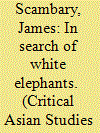

|
|
|
|
|
| Summary/Abstract |
A little more than a decade after independence, the small island state of East Timor is exhibiting the hallmarks of a neo-patrimonialist state. Since 2008, utilizing its considerable oil reserves, the government has embarked on a major infrastructure development program. However, despite a complex regulatory regime to safeguard the quality and transparency of spending, these systems have been routinely bypassed by executive-style decision making and a variety of informal and sub-legal devices. Public funds have been channeled to clientelist networks via often controversial infrastructure projects or state employment. This article details the emergence of this state and explains how a command style of government and complex systems of reciprocal obligation embedded in an array of parallel, informal networks have undermined the foundations of a Weberian rational-legal state, with critical consequences for development and stability.
|
|
|
|
|
|
|
|
|
|
|
|
|
|
|
|
| 20 |
ID:
167290
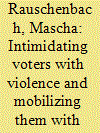

|
|
|
|
|
| Summary/Abstract |
Recent research suggests that intimidating voters and electoral clientelism are two strategies on the menu of manipulation, often used in conjunction. We do not know much, however, about who is targeted with which of these illicit electoral strategies. This article devises and tests a theoretical argument on the targeting of clientelism and intimidation across different voters. We argue that in contexts where violence can be used to influence elections, parties may choose to demobilize swing and opposition voters, which frees up resources to mobilize their likely supporters with clientelism. While past research on this subject has either been purely theoretical or confined to single country studies, we offer a first systematic cross-national and multilevel analysis of clientelism and voter intimidation in seven African countries. We analyze which voters most fear being intimidated with violence and which get targeted with clientelistic benefits, combining new regional-level election data with Afrobarometer survey data. In a multilevel analysis, we model the likelihood of voters being targeted with either strategy as a function of both past election results of the region they live in and their partisan status. We find that voters living in incumbent strongholds are most likely to report having being bribed in elections, whereas those living in opposition strongholds are most fearful of violent intimidation. We further provide suggestive evidence of a difference between incumbent supporters and other voters. We find support that incumbent supporters are more likely to report being targeted with clientelism, and mixed support for the idea that they are less fearful of intimidation. Our findings allow us to define potential hot spots of intimidation. They also provide an explanation for why parties in young democracies concentrate more positive inducements on their own supporters than the swing voter model of campaigning would lead us to expect.
|
|
|
|
|
|
|
|
|
|
|
|
|
|
|
|
|
|
|
|
|